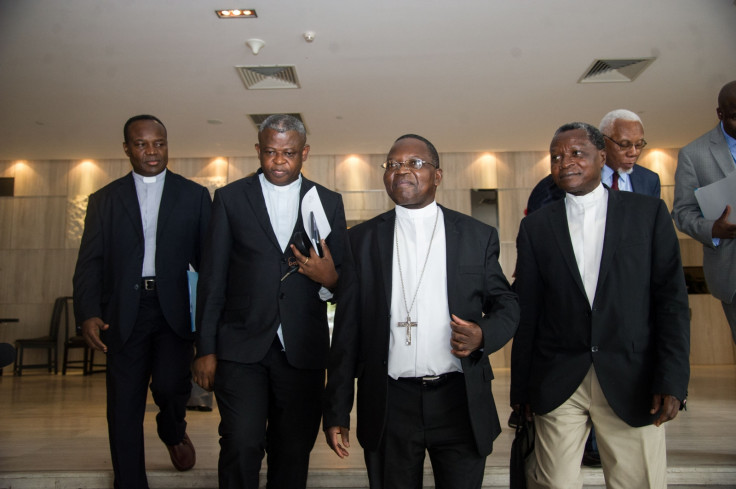Can Joseph Kabila and DRC's main opposition agree to sign a historic power sharing agreement?
CENCO hopes for political agreement as risks of political instability and violence grow.

The national dialogue talks brokered by the Democratic Republic of Congo (DRC)'s powerful Catholic church between President Joseph Kabila's political alliance, the presidential majority (MP) and the Rassemblement, a broad coalition of opposition groups, are resuming on Thursday (29 December).
Pressure is mounting for opposition parties and the government to agree a deal aimed at stemming the violence that followed Kabila's refusal to relinquish the presidency despite the expiration of his mandate as leader of the resource-rich African nation. This followed two years of failed political dialogues and an impasse between the ruling and opposition parties.
Human rights lawyer Olivier Kambala wa Kambala told IBTimes UK the five clauses on the table to determine a peaceful transfer of power to the next elected president include:
- Kabila remains as president until 2017
- Kabila pledges not to change the constitution during the first year of transition and not to run for office for a third term
- The guarantee of an executive ran by the Rassemblement coalition during the transition, and the disbandment of Prime Minister Samy Badibanga's government
- The establishment of a transitional authority to monitor the transition process led by opposition leader Etienne Tshisekedi
- A timely reform of the electoral commission - known as CENI
Before Christmas, Kabila and the opposition agreed in principle to a deal that would allow President Joseph Kabila to stay in power until 2017 but the different political actors have so far failed to complete the memorandum of understanding that should be presented later today.
Bishops confident deal signed by 30 December
The CENCO remains confident Kabila's majority and opposition parties of the Rassemblement coalition can agree on the issue of power-sharing between the government and provincial executives, which is still being discussed.
Bishops expect signatures on the finalised text and deal on 30 December, which they say is at 95% ready. Abbé Donatien Nsholé, CENCO's first deputy general secretary said "if we are dealing with serious actors, we believe that it is possible to sign the agreement on Friday".
Would the political actors overturn last week's achievements and fail to sign the agreement tomorrow, Nsholé said "it would be really disheartening". He added: "I would even say (it would be) disrespectful to the bishops to remove the compromises already made." For the powerful CENCO, the signature of this political accord is a matter of credibility. As one of the institutions closest to the Congolese people, who are at 50% Catholic, the Catholic Church's role relative to the state could ensure unrest is prevented.
Kabila's camp and opposition more pessimistic
Unlike the bishops, Kabila's majority and members of the opposition have appeared more pessimist as talks resumed this morning. The Rassemblement coalition is demanding that it is given the reigns of the government, and that one of its leaders is appointed as Prime Minister, to counterbalance the retention of Kabila at the Presidency.
Gathered around the historic opponent Étienne Tshisekedi, the Rassemblement is also threatening to walk out if strong measures are not immediately taken to open up the political space. This includes dismissing charges against opposition leaders and members – including Moise Katumbi and Franck Diongo, and the promise that provincial governments, which it accuses of repressing opposition supporters and dissenting voices, are reshuffled. Meanwhile, another group, the Movement for the Liberation of Congo (MLC) and its coalition, the Front for the respect of the Constitution, maintain they are against the retention of Kabila as the head of state.
These are demands Kabila's MP does not appear to be ready to consent to, as it says that governors elections have already taken place, and that a new government made up of both MP and opposition ministers has already been appointed. For the Rassemblement, which earlier this month told IBTimes UK it knew it would not reach a peaceful solution, however, Prime Minister's Samy Badibanga's new government is not inclusive enough.
In a tweet, the deputy director of Kabila's cabinet, Jean-Pierre Kambila, claimed the announcement made about the "certainty of signing an accord under the CENCO's aegis (is) manipulation. Negotiations continue."
#RDC Les annonces sur la certitude de signer un accord sous l'égide de la #CENCO participent de la manipulation. Les pourparlers continuent.
— Jean-Pierre Kambila (@JPKambila) December 28, 2016
© Copyright IBTimes 2025. All rights reserved.






















